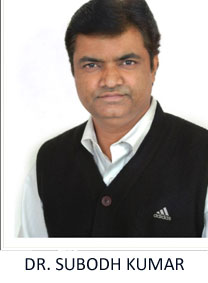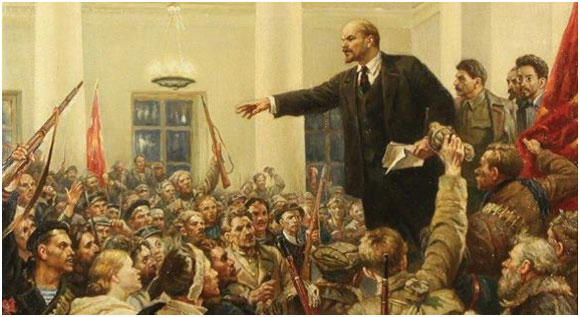 The Bolsheviks were a revolutionary party, committed to the ideas of Karl Marx. They believed that workers will unite and liberate themselves from the economic and political control of the ruling classes. A year after seizing power Vladimir Ilych Lenin changed the name from Bolshevism to Communism. When we analyse the ideological evolution after hundred years of Bolshevik Revolution, we find that Communism gained momentum during 1914-60, and captured the hearts of idealists across the globe. The two world wars and a Great Depression doomed capitalism and communism seemed to be the obvious alternative.
The Bolsheviks were a revolutionary party, committed to the ideas of Karl Marx. They believed that workers will unite and liberate themselves from the economic and political control of the ruling classes. A year after seizing power Vladimir Ilych Lenin changed the name from Bolshevism to Communism. When we analyse the ideological evolution after hundred years of Bolshevik Revolution, we find that Communism gained momentum during 1914-60, and captured the hearts of idealists across the globe. The two world wars and a Great Depression doomed capitalism and communism seemed to be the obvious alternative.
But, soon communism lost its charm because of mass oppression, starvation, mass murder, genocide and terror. These incidents challenged the foundations of human mankind. Moreover, the struggle in Soviet Union, Mao Zedong China, Mengistu Haile Mariam Ethiopia, Fidel Castro’s Cuba and Pol Pot’s Cambodia, were millions of human were killed by the agents of an oppressive totalitarian system aiming for total control and the elimination of the oppositions. Many more deaths were due to communist generated mass famines in Stalin’s Great Famine in Ukraine, Mao’s China and modern day North Korea.Many more died in the last century fighting to keep their countries free from communism in places like Vietnam, Korea, Malaysia, Greece, Nicaragua, El Salvador, Angola and Russia itself.

Lenin himself believed that “Everything that exists deserves to be destroyed”. Communism fell apart after the two hundred years of French Revolution (1789). The principle plank of French Revolution i.e., Liberty, Equality and Fraternity was celebrated across the globe. The disenchantment with the concept of central planning gave way for negative freedom where market is based on classical liberalism, where the role of the state is minimum. The New Right idea of Margret Thatcher and Ronald Reagan launched a new era of economy management. As a result after 1989, we saw the disintegration of Soviet Union, end of Gulf War, Unification of Germany, Gulf war and the end of the authoritarian regimes in East Central Europe, Baltic Countries and transition from dictatorship to democracy in the Philippines, Argentina and Brazil. Due to ideological constraints and arbitrary planners – communism paved the way for meritocracy based market system. Friedrich Hayek, a great supporter of negative freedom argues that a market system is like a machine, always looks for demands from the society and also plans the potential producers. Here, producers and customers are in a win-win situation.
When we analyze the new global economic order we find that Governments in some countries fail to provide people’s wants, security, shard economic growth and the basic public services that are core for achieving individual opportunity. Moreover, the challenges of liberal democracy are also because of the rise of global middle class. These middle class believes that elites have betrayed them. Moreover, the religious fundamentalism and ethnic loyalties on one point of time seemed to replace ideologies by the ancient conflict between civilizations. This was visible when we see the attack on World Trade Centre at New York. After the September 11, 2001 attacks, Samuel P. Huntingon idea of “The clash of civilizations” did gain ground but very soon modernity prevailed. Liberal democracy faced few challenges from medieval Islamism but it has limitations and were located in regions were Muslims literacy rate is very low and where Muslims are disenfranchised. Russia and China also challenge liberal democracy because China has a one-party state government while Russia is a de facto authoritarianism. Despite these few challenges, liberal democracy is the most appealing across the globe.
There has been a change in the nature of ideology and it has been replaced by politics of bargaining and adjustment based on values towards humanity. This reflects a strong and wide ideological consensus in a society regarding values. Many values are governing the societal endevarous and has opened the new discourse and guiding principle for governments worldwide. To continue liberal democracy as a universal norm, it must explore the future of human kind. Yuval Noah Harari, in his 2011 book, “Sapiens, A Brief History of Human Kind”, shows that our behaviors are controlled by self-replicating cultural biases that may lead to destruction of humanity and that industrialization is the product of that bias. Moreover, political decay has tremendous effects on established democracies like the United States in which crony capitalism and corruption has eroded liberty and equal opportunity. Liberalism has great quality to accept criticism and evolve. In 1980s, Soviet premier Mikhail Gorbachev tried to break central planning though political and economic liberalisation but Gorbachev did not succeed. Whereas, China’s Dang Xiaoping preferred political centralization but went for market reforms and today China represents 14.8 per cent share of the global economy. The success of liberalism had great effects on the minds of political thinkers. Francis Fukuyama (1989) wrote that it is not just the end of cold war but also the end of history. It meant that the end point of mankind’s ideological evolution and the universalisation of western liberal democracy.
But the animal spirit and greed to exploit and earn money from the free market economy has opened the flood gate of criticism for liberalism. Moreover, genocide that took place in Rwanda and other parts of Africa, demonstrate that liberalism have failed morally and reflects deep rooted flaws that govern our priorities and fundamental principles. Yet, liberalism still has no real competition when we see the failure of Orange Revolution in Ukraine, the Arab Spring and backsliding of democracy in Thailand, Turkey and Nicaragua. Crisis in the ideology of liberalism is because new values for mankind and ideas pertaining to fraternity has not been achieved.
Through constitutional democracy governments can provide liberty and equality but to achieve fraternity it needs greater value that is to love humanity through self-sacrifice. Moreover, the technological innovations has reduced the distance across the globe due to which ideology has been deconstructed and democratized into several ideas which is governing the human kind. Hence, its nature to adjust and transform through piece meal engineering has made liberalism as a guiding principle for future humankind. Fukyama himself stated that “there can be no end of history without an end of modern natural science and technology”.
(The Writer Teaches Political Science At Maharaja Agrasen College, University Of Delhi)